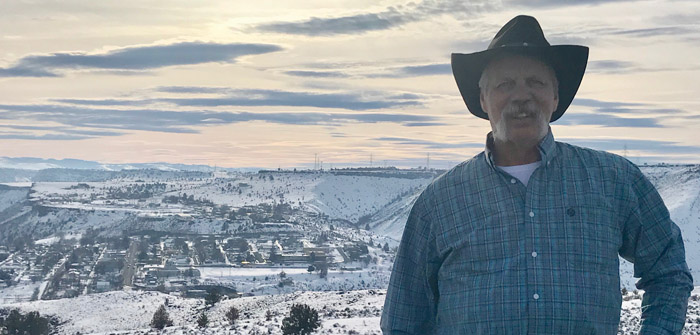(Maupin Mayor, Lynn Ewing, was one of many local champions who helped bring the city-owned 1-gigabit broadband network to fruition | Photo by Theresa Ewing)
Maupin, the Central Oregon town of 430 best known for its access to whitewater rafting and fly-fishing along the Lower Deschutes River, is now home to one of the state’s fastest broadband networks.
The high-density fiber optic broadband network can provide speeds of one gigabit per second (gbps) per customer — the fastest broadband service available in the Pacific Northwest – vastly improving the city’s economic and educational opportunities. The $2 million project, which took more than three years and financing from seven partners — including more than $935,000 from the State of Oregon — is a boon to the small town located less than two hours from Portland and two hours from Bend.
“This is a total game-changer for Maupin,” says Maupin Mayor Lynn Ewing. “Three years ago, when we started down this path, our entire community lacked access to strong, reliable internet. This put our schools and businesses at a serious disadvantage. Even second homeowners and tourists who come to Maupin to ‘get away from it all’ still wanted access to high-speed internet. We knew that if we didn’t address this problem, our town could literally disappear.”
Broadband carriers typically overlook smaller, out-of-the-way communities such as Maupin in favor of bigger markets. Rural communities usually do not include enough subscribers for telecommunications companies to justify expanding broadband service to them, creating a gap known as the broadband divide. Smaller, more remote communities like Maupin are left with antiquated internet options that are often slow and prone to power outages.
In 2015, the Federal Communications Commission concluded that rural communities not only lacked access to fast, reliable internet compared to rural cities, but they often lacked access to more than one service provider. Competition was determined as an important way to ensure that rural America did not fall further behind.
The “Maupin model,” in which the city owns the fiber network but provides open access to private telecom providers, allowing them to compete on the basis of price and quality of service, is a win-win, according to Keith A. Mobley, a lawyer and a board member of QLife Network, an inter-governmental agency that’s helping facilitate reliable, cost-effective, open-access link to fiber optic. “Working with private telecommunications providers has been mutually beneficial. Among other things, it’s increased the availability of fiber backbone serving cellular providers.”
QLife partnered with Portland-based LS Networks to design and install Maupin’s fiber network. Both Hood River-based Gorge.Net and LS Networks are providing internet service to residents and businesses.
“Maupin remained steadfast in its pursuit of attaining higher-quality internet for its residents,” says Byron Cantrall, CEO of LS Networks. “As a locally owned carrier, we want to see cities like Maupin be able to compete and grow. We’re in conversations with numerous cities around the Pacific Northwest who are eager to leverage innovative funding strategies and technologies to make their communities more competitive — in areas like education, healthcare, emergency responsiveness and even tourism.”
In addition to its new broadband network, Maupin is beautifying its downtown, improving pedestrian walkways, and building a new 3,000-square-foot library as part of a new 6,000-square-foot Civic Center. With rising housing costs and an influx of people moving to Bend and Portland, Maupin is attracting more young professionals, business owners and families to settle there.
“I have a dynamic and demanding work schedule, and I absolutely rely on high-speed internet to do my job,” says Michael Jones, director of research at San Francisco-based Salesforce. “But when I’m not working, I want to spend time getting to know my neighbors and being on the river.” He and his wife are in the process of moving from Portland to Maupin, where he will work remotely most of the time. “I think the word will get out and more telecommuters and tech companies will follow.”





